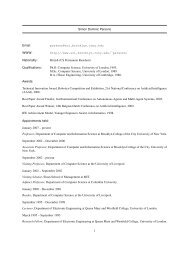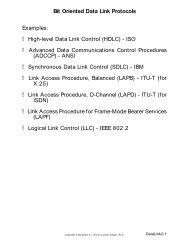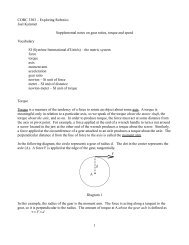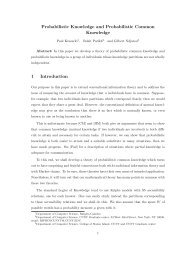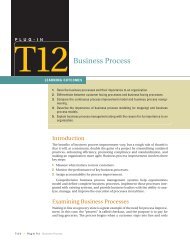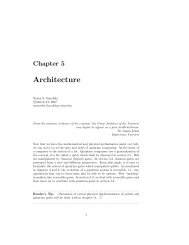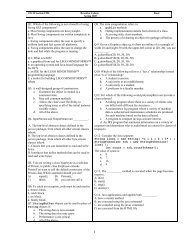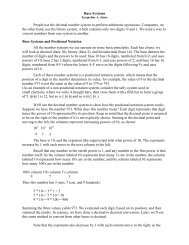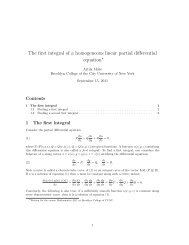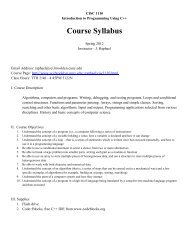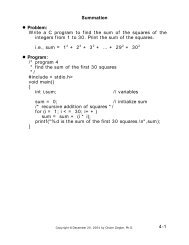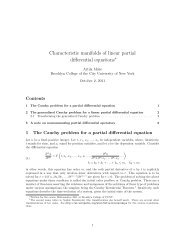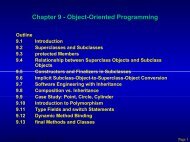*302 Greig and Others v Insole and Others 1977 G. No. 22461977 J ...
*302 Greig and Others v Insole and Others 1977 G. No. 22461977 J ...
*302 Greig and Others v Insole and Others 1977 G. No. 22461977 J ...
Create successful ePaper yourself
Turn your PDF publications into a flip-book with our unique Google optimized e-Paper software.
[1978] 1 W.L.R. 302 Page 7<br />
[1978] 1 W.L.R. 302 [1978] 3 All E.R. 449 (1978) 122 S.J. 162 [1978] 1 W.L.R. 302 [1978] 3 All E.R. 449 (1978)<br />
122 S.J. 162<br />
(Cite as: [1978] 1 W.L.R. 302)<br />
he plays in any such match. The plaintiffs in both<br />
actions claim that these new or proposed new rules<br />
will be legally invalid <strong>and</strong> seek orders which will<br />
effectively prevent the ICC <strong>and</strong> TCCB from implementing<br />
them. In the second action, World Series<br />
Cricket further claims that the new or proposed new<br />
rules are or would be an unlawful inducement to a<br />
number of players who have entered into contracts<br />
with it, including the three individual plaintiffs, to<br />
break such contracts; it seeks appropriate relief on<br />
this basis.<br />
For many years, the ICC has effectively exercised<br />
sole control over the promotion of first class cricket<br />
matches played at international level. Under its<br />
constitution it has two “foundation members,”<br />
namely, the United Kingdom <strong>and</strong> Australia, four<br />
“full members,” namely, India, New Zeal<strong>and</strong>, West<br />
Indies <strong>and</strong> Pakistan <strong>and</strong> some 16 “associate members.”<br />
Its chairman is the president of the Marylebone<br />
Cricket Club (“the MCC”) for the time being<br />
or his nominee. Its secretary is the secretary of the<br />
MCC. Under its auspices are played official Test<br />
Matches, which are defined in its constitution as<br />
matches played between teams selected by foundation<br />
<strong>and</strong> full members as representative of their<br />
countries. The functions assigned to the ICC by its<br />
constitution include responsibility for the status of<br />
official Test Matches, the qualification rules for<br />
cricketers for Test Matches <strong>and</strong> the confirmation of<br />
tours in the programme for visits of official teams<br />
between foundation <strong>and</strong> full member countries; it<br />
has duly laid down certain minimum qualification<br />
rules that apply to all countries which participate in<br />
Test Matches. It is further empowered in conjunction<br />
with the recognised governing body of cricket<br />
of any country to impose more stringent qualification<br />
rules for that country. This power also has been<br />
exercised. The effect of the ICC's constitution<br />
therefore is such that it claims the exclusive power<br />
to decide the qualifications which any cricketer<br />
must possess, if he is to be eligible to play for any<br />
country in official Test Matches.<br />
The governing body of cricket of the United<br />
Kingdom recognised by the ICC is an unincorporated<br />
association known as “the Cricket Council.”<br />
Under its constitution, it is to<br />
“act as the governing body for cricket in the United<br />
Kingdom <strong>and</strong> be responsible for the conduct <strong>and</strong> organisation<br />
of cricket throughout the United Kingdom<br />
<strong>and</strong> for official tours overseas recognised by<br />
the council.”<br />
It also appoints representatives for the United Kingdom<br />
to the ICC.<br />
The task of actually organising <strong>and</strong> administering<br />
Test Matches in the United Kingdom <strong>and</strong><br />
also MCC overseas tours is performed not by the<br />
ICC or the Cricket Council but by another unincorporated<br />
body, the TCCB. The membership of the<br />
TCCB consists of the MCC, each of the 17 first<br />
class counties <strong>and</strong> the Minor Counties Cricket Association.<br />
Under its constitution, it is responsible to<br />
the Cricket Council for a number of matters, including<br />
the organisation <strong>and</strong> administration of Test<br />
Matches in the United Kingdom <strong>and</strong> MCC overseas<br />
tours <strong>and</strong> also the administration *309<br />
<strong>and</strong> promotion of the First Class County<br />
Championship, <strong>and</strong> the rules governing the registration<br />
<strong>and</strong> qualification of cricketers in county cricket.<br />
It also administers sponsored one day matches<br />
between the Test-playing countries known as<br />
“Prudential Trophy” matches, <strong>and</strong> other sponsored<br />
competitions involving the first class counties such<br />
as the “Gillette Cup,” “John Player League” <strong>and</strong><br />
“Benson <strong>and</strong> Hedges Cup” competitions. Under the<br />
rules of the TCCB any cricketer has to be registered<br />
with the TCCB if he is still to be eligible to play<br />
county cricket. Subject to its overriding responsibility<br />
to the Cricket Council, the TCCB thus claims<br />
the exclusive right to regulate the qualifications<br />
which must be possessed by a cricketer if he is to<br />
be eligible to play in county cricket matches. It is to<br />
be observed, however, that the TCCB, like the ICC<br />
itself, has no authority beyond that conferred by the<br />
consent of its members <strong>and</strong> the plaintiff cricketers<br />
are not members of either body.<br />
© 2011 Thomson Reuters.



